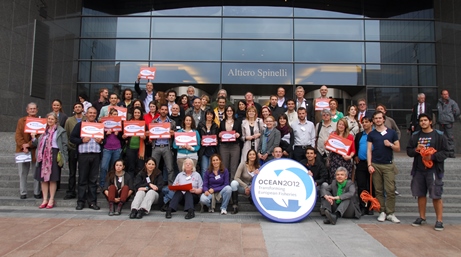OCEAN2012 Welcomes European Parliament Vote on New Fisheries Fund
Action concludes 5 year effort to reform Common Fisheries Policy
STRASBOURG — The European Parliament today concluded five years of effort to reform the Common Fisheries Policy by adopting the final piece of legislation, the European Maritime and Fisheries Fund (EMFF).
This statement is also available from language dropdown box above: Français / Español / Deutsch / Italiano / Português and via these links (PDF): Nederlands / Polski

OCEAN2012 members in front of the European Parliament
The reform of the EU’s Common Fisheries Policy, or CFP, was launched on April 22nd 2009. Last May 30th the European Parliament and Council reached a political agreement on the CFP’s basic regulation. That was adopted in December. On January 28th agreement was reached on the related European Maritime and Fisheries Fund. Today’s approval of that text marks the formal adoption of historic legislation, which, if effectively implemented, will end EU overfishing, restore fish stocks and provide greater financial support for responsible fisheries management.
"OCEAN2012 congratulates the European Parliament, EU fisheries ministers and the European Commission for achieving an historic reform that lays the way for ending EU overfishing.
Great credit goes to the many civil society groups and EU citizens who sustained support over five years for a fundamental reform of the Common Fisheries Policy."
Uta Bellion, director of The Pew Charitable Trusts’ EU Marine Programme and coordinator of OCEAN2012, a coalition which supported a fundamental CFP reform.
While the basic regulation includes ambitious targets for ending overfishing and restoring fish stocks, the fisheries fund is less ambitious in ending harmful fisheries subsidies. The final text provides more funds for data collection, control and enforcement. However, it also allows subsidies for measures such as vessel modernisation, which can contribute to overfishing. Today’s vote now shifts the focus to implementing the measures in member states, including determining how to use the available funds.
“Considerable leadership and political courage were displayed in securing reform, but this does not guarantee an end to EU overfishing. That requires member states to set sustainable fishing limits and implement the discard ban, ending the wasteful practice of throwing dead fish back into the sea. EU citizens want to see more fish in our waters and healthy oceans,” Bellion said.
The new EMFF will come into force after its formal confirmation by fisheries ministers and its publication in the Official Journal of the European Union.



